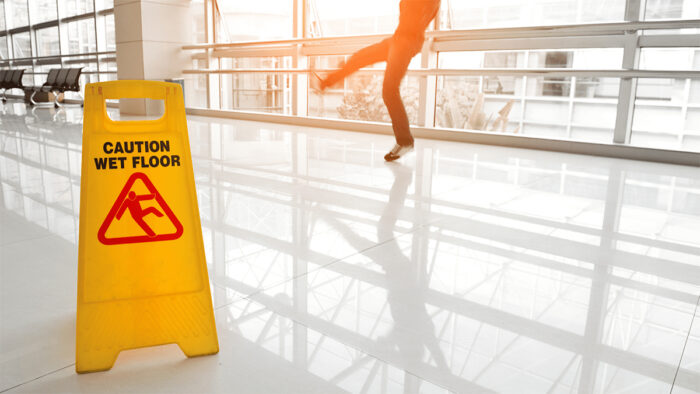Slips and fall accidents can result in fatal injuries that can leave an individual in pain for days. Recognizing this risk, it is important to enlighten you on the type of insurance that covers slip and fall accidents. This article aims to explore insurance options that cover accidents caused by slip and fall.

It is noteworthy that the type of insurance that provides coverage for slip and fall accidents depends on where the accident occurred and if it is included in your policy.
What Insurance Covers Slip and Fall Accidents?
There are lots of insurance policies that cover injuries from slip and fall accidents that occur in the workplace, at home, in a private residence, apartment complex, or government-owned property.
• Business insurance policy
Most business owners are required to carry a minimum amount of coverage to protect their business against a wide range of risks. Every business is expected to have commercial property insurance that can come in handy in the event of a fall or slip accident.
A business insurance policy will cover slip-and-fall accidents. For instance, if you slip and fall at a store on a wet floor, the store’s business insurance will cover your medical expenses.
However, there are exceptions to what type of situation your business insurance policy can cover. If it is the case whereby a third party or vendor contributed to how you slipped and fell in the store, you can be reimbursed from the vendor’s insurance instead.
• Homeowners insurance
In most cases, the slipping and falling at a private residence is not caused by a third party; it is often straightforward. Hence, if you slip and fall when in your friend’s house, you can file a claim with the insurance company your friend is working with.
• Workers’ Compensation
To protect workers against several risks, including slip and fall accidents, employers must carry insurance coverage that can be utilized in the event of a claim. In the event of a slip and fall accident, your workers compensation will be able to cover the cost associated with getting you treated.
On the other hand, regardless of who was at fault for the accident, if you slip and fall in a work environment, you cannot sue your employer for any injuries if he/she carries a worker’s compensation policy.
• Renters insurance
The location of the slip and fall will determine whether you can make a claim with the renters insurance. If you slip and fall in an apartment or rented house, your renters insurance might cover it.
If you trip and fall in a rented house or apartment, things could get a little trickier. On the other hand, you would probably make a claim with the commercial property insurance of the property management firm if you fell in a public space, such as the parking lot or a stairwell.
Will Employee Injuries Be Covered By General Liability Insurance?
It is not covered by general liability insurance to work with yourself or your own workers. You would require workers’ compensation insurance coverage for this. It provides coverage for medical expenses and missed income in the event that you or a worker is hurt on the job.
Most states mandate it for any company employing one or more people as well as for lone owners in higher-risk occupations like construction trades.
Preventive Measures for Slip and Fall Accidents
To minimize the chances of slip and fall accidents, there are certain measures you can take, such as:
• Organize training programs for your employees
This is one of the best ways to prevent slip and fall accidents from occurring in the workplace. Ensure your employee is enlightened of business hazards that are associated with slip and fall accidents.
Provide them with adequate information and strategies to implement in order to prevent the likelihood of slip and fall accidents. By doing this, it would help your employees know how to recognize potential hazards and precautionary measures to avoid them.
• Choose the right floor surface
This is also one of the essential preventive measures for slip-and-fall accidents. Purchasing the right floor surface for your work environment is an effective tool by which accidents can be reduced.
Choose floor surfaces that are durable and slip-resistant; mats can also be an alternative to tiled floors. You can consider using mats to decrease the wetness of the floor.
• Display warning signs
In a case where you just finished cleaning the floors and you need some time for it to dry, you can put up a warning sign that indicates that the floor is a wet area.
The best way to keep people away from hazardous areas is by displaying warning signs to let people know it is not a safe place to tread on. This can ultimately help to avert unfortunate situations such as slip-and-fall accidents.
• Install surveillance equipment
Installing surveillance systems is also another way of reducing the rate of slip and fall accidents. You can keep track of your workers activities from the CCTV. This will enable you to monitor your workplace and identify areas that could lead to injuries.
• Conduct regular inspections
To prevent a slip and fall accident in the workplace, you can designate a staff member who will inspect the work environment regularly to identify potential injury risks. By doing this, you will be able to maintain the safety of your workers and minimize the rate at which slip and fall accidents occur.
In order to manage the financial effects of slip and fall accidents, having insurance is essential. Anyone involved in this type of incident must comprehend the various forms of coverage and the claims procedure.
Being knowledgeable and ready is crucial to managing issues involving workers’ compensation, personal injury, or property claims efficiently.



